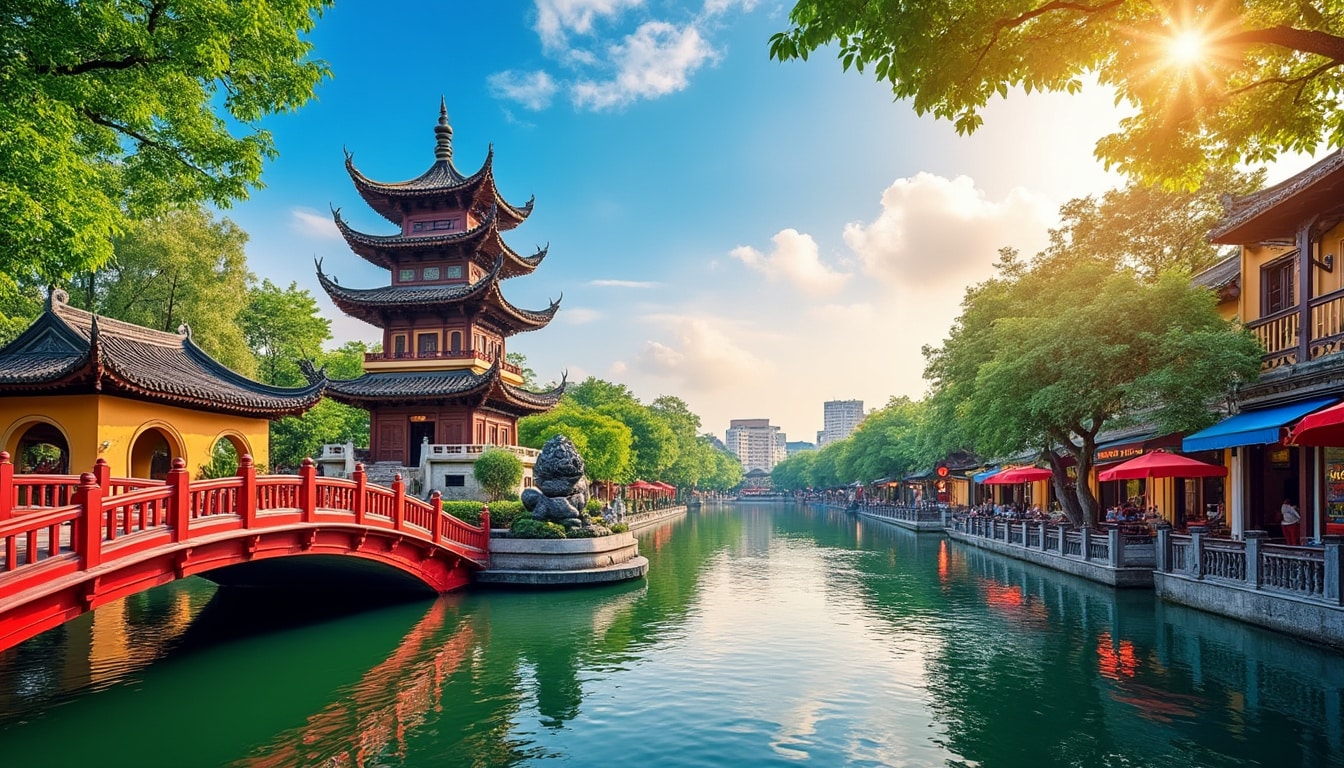Welcome to Hanoi, Vietnam’s enthralling capital, where the echoes of ancient history resonate through its vibrant streets. With over a millennium of culture and conquest, Hanoi is a city where the past seamlessly intertwines with modernity. From bustling street markets to serene lakes and ancient temples, Hanoi offers a fascinating experience for every visitor. As you explore, you’ll encounter a city marked by diverse influences—from imperial dynasties to French colonial presence—that have each left an indelible mark on its architecture, culture, and spirit. Let’s dive into the captivating history of Hanoi, discovering the tales and transformations that have shaped this dynamic metropolis.
Geography and Early History of Hanoi
The geographical significance of Hanoi has greatly influenced its historical journey. Nestled in the northern region of Vietnam, on the western banks of the Red River, Hanoi’s strategic location made it a natural choice for the establishment of a thriving city. The Red River not only provided a fertile delta conducive to agriculture but also served as a crucial trade route that linked the region with China and beyond. It is this prime positioning that laid the foundation for Hanoi’s role as a political and cultural hub from as early as the 11th century.
Hanoi’s story begins with Emperor Lý Thái Tổ, the founder of the Lý dynasty, who established the city as Thăng Long in 1010. Though initially a small settlement, Thăng Long quickly grew into a vibrant capital under the Lý dynasty, which lasted over two centuries. The name “Thăng Long” (Rising Dragon) was inspired by a vision the emperor had of a dragon ascending from the Red River—a powerful omen of prosperity and ascendancy.
Throughout its early history, the city remained central to political power, governance, and cultural development. It hosted various dynastic capitals, each dynasty leaving their imprint on the cityscape. The Hồ dynasty, although short-lived, relocated the capital for defensive reasons in 1397, yet Thăng Long persisted as an economic and cultural center.
The city’s historical narrative continued to evolve under the Nguyễn dynasty, who established their capital in Huế in the 19th century. Nonetheless, Hanoi maintained its stature as an important administrative and economic center in northern Vietnam during their rule.

By the 19th century, French colonial influence began transforming the city’s character. The French occupation infused Hanoi with distinctive European architectural styles, leading to the construction of iconic structures such as the Hanoi Opera House, the St. Joseph’s Cathedral, and the Long Bien Bridge—designed by the same engineer who created the Eiffel Tower. This era of structural transformation heralded a new chapter in Hanoi’s evolving identity.
Colonial and Post-Independence Hanoi
The arrival of the French in the late 19th century marked the beginning of Hanoi’s colonial era. As the capital of French Indochina, Hanoi underwent significant urbanization and modernization. The French introduced wide boulevards and grand villas, infusing the city with a European air that contrasted with its traditional Vietnamese quarters.
The colonial period wasn’t only about architectural transformations; it was a time of sociopolitical changes, bringing about new educational systems, industries, and technologies. Hanoi became a melting pot of influences, hosting diverse communities and becoming a focal point for intellectual and cultural exchange.
However, the colonial era also sparked resistance and a yearning for independence. The struggle culminated when Ho Chi Minh declared Vietnam’s independence in Hanoi on September 2, 1945. This momentous event marked the birth of the Democratic Republic of Vietnam, transitioning Hanoi from colonial rule to becoming the capital of a nation seeking self-governance.
Post-independence, the city faced numerous challenges, including reconstruction and adapting to new political realities. The division of Vietnam in 1954 placed Hanoi as the capital of North Vietnam. During the Vietnam War, the city was a strategic target and suffered significant destruction from bombings, which deeply affected its infrastructure and population.
After the war, the reunification of North and South Vietnam in 1975 established Hanoi as the capital of the Socialist Republic of Vietnam. The aftermath of war and devastation paved the way for the Đổi Mới economic reforms in 1986, leading to the modernization and rejuvenation of the city.
Today, Hanoi is a testament to resilience and renewal, with remnants of its colonial past living harmoniously with its burgeoning economy and vibrant culture.
| Year | Event | Significance |
|---|---|---|
| 1010 | Foundation of Thăng Long | Established as the capital of Đại Việt under Emperor Lý Thái Tổ |
| 1873 | French Conquest | Marked the beginning of French colonial rule |
| 1945 | Proclamation of Independence | Ho Chi Minh declared Vietnam’s independence from French rule |
| 1975 | Reunification | Hanoi became the capital of a unified Vietnam |
Cultural Heritage and Traditions of Hanoi
Hanoi is a city that beats with the rhythm of its cultural heritage. The Old Quarter, with its narrow, bustling streets, serves as a living tapestry of Hanoi’s past. Each street traditionally specializes in particular goods, reflecting the city’s rich mercantile history. Walking through these streets, you’ll feel the pulse of history mingling with the vibrancy of contemporary life.
One of Hanoi’s most cherished traditions is the Thang Long Water Puppet Theatre, offering a unique art form that dates back over 1,000 years. Originating from the Red River Delta, this theatrical spectacle captures the spirit of Vietnamese folklore and rural life through its enchanting performances on water.
The Temple of Literature is another testament to Hanoi’s cultural depth. As Vietnam’s first national university, it stands as a symbol of the nation’s reverence for education and Confucian teachings. Visitors can wander through its courtyards, reflecting on the continuum of knowledge celebrated within its walls.
Hanoi’s culinary scene is an integral part of its cultural legacy, and a visit wouldn’t be complete without indulging in the vibrant Hanoi Street Food. Dishes such as pho and bun cha offer a taste of authenticity, embodying the heart and soul of Vietnamese cuisine. Sampling these local delights is a journey through the flavors and stories that define the city.
- 🥢 Explore famous foods of Hanoi for an authentic culinary experience.
- 🎭 Attend a show at the Thang Long Water Puppet Theatre and witness ancient art in action.
- 📚 Visit the Temple of Literature to delve into centuries of scholarly tradition.
- 🕌 Discover the architecture and tranquility of Hanoi’s historic temples and pagodas.
Evolving Urban Landscape of Hanoi
Hanoi’s urban landscape is a study in contrasts, shaped by historical layers and modern aspirations. As the city continues to develop, its architectural fabric reflects both its storied past and contemporary growth. This juxtaposition of old and new can be vividly seen in areas like the Hanoi Old Quarter and the French colonial districts.
The influence of French colonialism is still visible in the iconic buildings that dot the city, such as the Hanoi Opera House and the St. Joseph’s Cathedral. These structures stand as landmarks of cultural exchange and architectural heritage, drawing visitors into the grandeur of a bygone era.
Modern Hanoi is rapidly evolving with cutting-edge infrastructure and dynamic urban planning. Efforts to balance preservation with progress are evident in the initiatives aimed at sustainable development. The city’s expanding metro system is a testament to Hanoi’s commitment to reducing traffic congestion and enhancing public transportation.
As the city grows, its skyline is adorned with high-rise buildings, reflecting an economy that ranks among Southeast Asia’s fastest-growing. This transformation is driven by significant investments from international businesses, positioning Hanoi as an economic powerhouse.
Despite its urban sprawl, Hanoi remains deeply connected to its cultural roots. This connection is especially noticeable in areas like the Hanoi Silk Village, where tradition and craftsmanship are revered, and the vibrant street life that animates the city.
- 🏙️ Explore Hanoi’s architectural and urban features for a deeper understanding of its development.
- 🏢 Visit modern landmarks alongside historic sites for a comprehensive view of the city.
- 🚇 Use the metro to navigate the city efficiently as you explore its many attractions.
- 🛍️ Experience local crafts and traditional goods at the Hanoi Silk Village for a unique shopping adventure.
Modern Hanoi: Economic Growth and Cultural Resurgence
Today, Hanoi stands as a vibrant testament to resilience and renewal, its economic prowess complemented by a rich cultural resurgence. The city’s economy has seen remarkable growth, driven by sectors such as technology, tourism, and manufacturing. With a population that continues to grow, Hanoi has become a leading urban center in Vietnam, offering opportunities for both businesses and residents alike.
Hanoi’s dynamic culture is palpable in every corner, from the chaotic traffic to the tantalizing aromas that waft from its street food vendors. The local flavors, deeply rooted in the city’s culinary traditions, attract both locals and visitors seeking authentic experiences.
Festivals play a crucial role in preserving Hanoi’s cultural identity and fostering community spirit. Celebrations such as Tet, the Lunar New Year, bring the city alive with vibrant displays of color and tradition, offering insights into the cultural tapestry of Vietnam.
Investment in education and cultural institutions continues to be a priority, underscoring Hanoi’s role as a center of learning and creativity. The city is home to numerous universities and museums, such as the Vietnam National Museum of History, where visitors can delve into the nation’s past through captivating exhibits.
The future looks bright for Hanoi as it balances growth with the preservation of its rich heritage. Initiatives focused on green urban planning and sustainability ensure that Hanoi remains a livable and thriving metropolis, honoring its illustrious past while paving the way for an exciting future.
| Aspect | Features | Impact |
|---|---|---|
| Economic Growth | Technological advancements, tourism, manufacturing | Increased job opportunities, urban development |
| Cultural Festivals | Tet, Mid-Autumn Festival | Preserving traditions, fostering community spirit |
| Educational Institutions | Top universities, cultural museums | Center for learning and creativity |
FAQs about Hanoi
- 📅 What is the best time to visit Hanoi?
The best time to visit Hanoi is from September to December or February to April, when the weather is mild and pleasant. - 🏛️ What are some must-visit historical sites in Hanoi?
Key historical sites include the Ho Chi Minh Mausoleum, Temple of Literature, and the Thang Long Imperial Citadel. - 🛍️ Where can I experience traditional Hanoi shopping?
Visit the Hanoi Old Quarter and the Dong Xuan Market for an authentic shopping experience featuring local crafts and souvenirs.
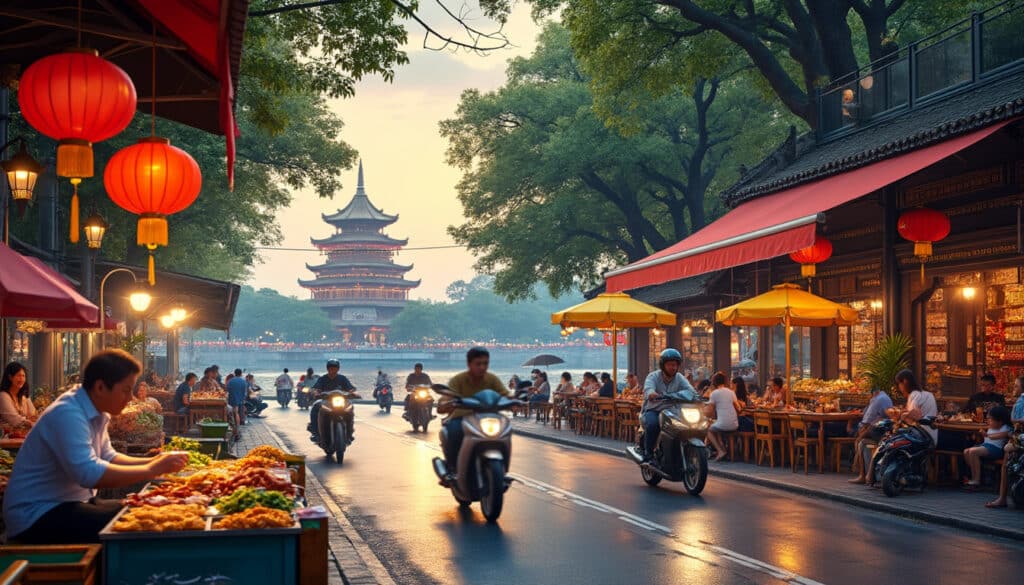
Fun Facts & Curiosities About Hanoi
Hanoi, the vibrant capital of Vietnam, is a fascinating mix of rich history, unique traditions, and modern progression. From its celebrated street food scene to the captivating water puppet shows, Hanoi is both a city of lakes and legends. Visitors…
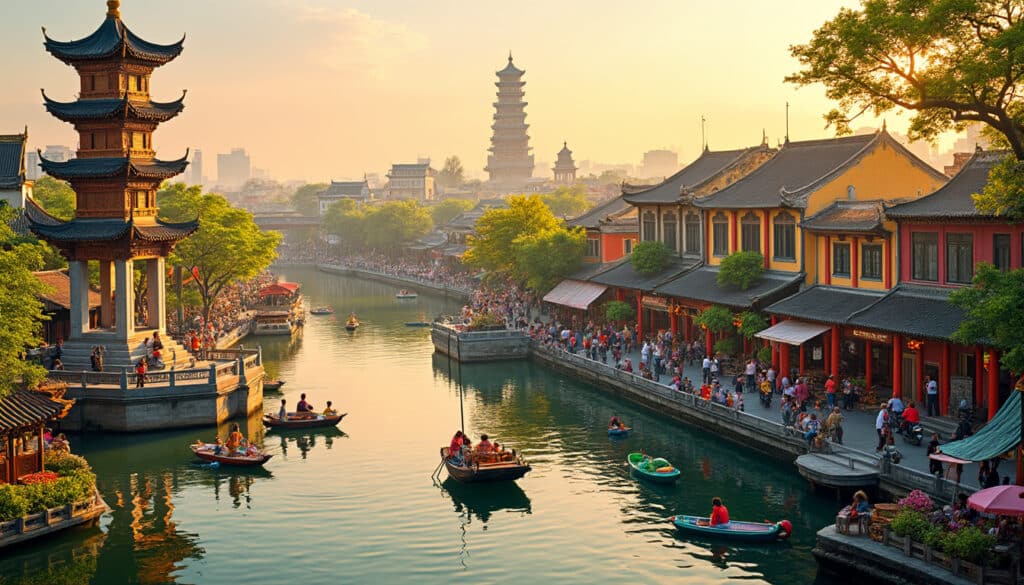
Architecture and urban features of Hanoi
With a rich tapestry of cultures and historical evolution, Hanoi stands as a captivating testament to Vietnam’s architectural diversity. This city’s allure doesn’t just lie in its remarkable history but in its unique blend of oriental and French-style architecture that…
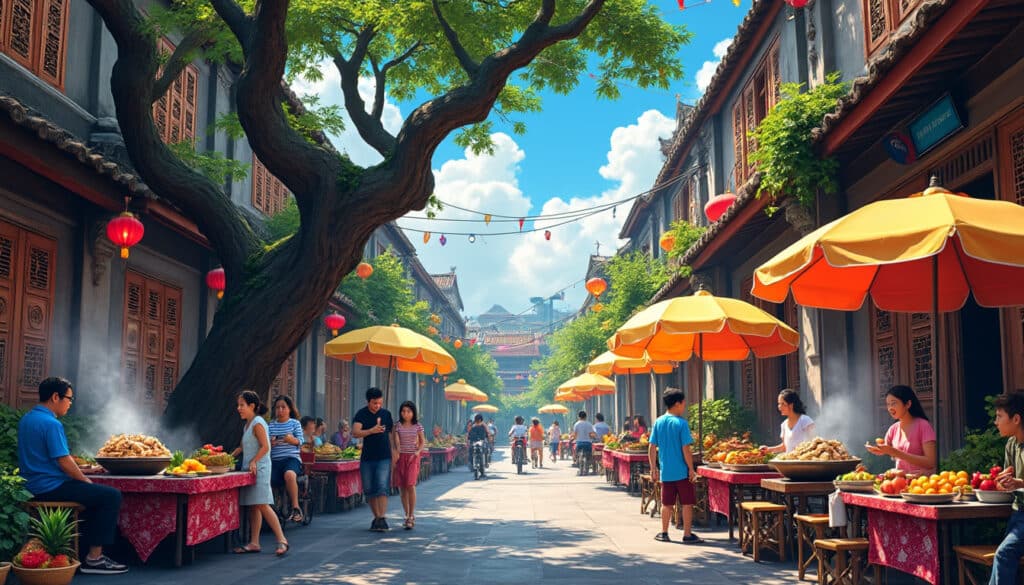
Experience the daily life in Hanoi, a city brimming with vibrant charm and historical depth. As you navigate through the bustling streets, the harmonious blend of the old and new reveals itself in every corner. From savoring delectable street food…
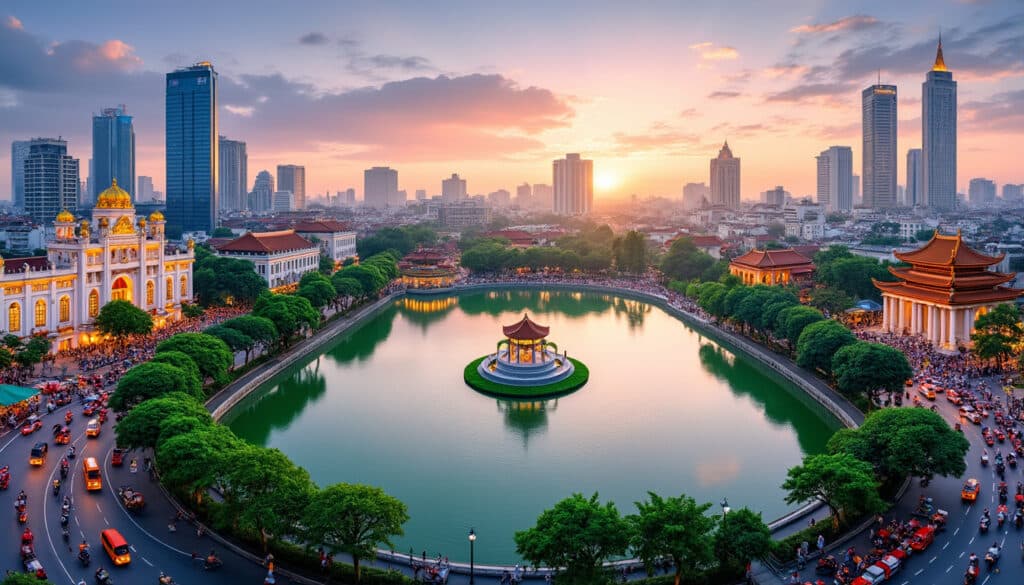
Demographics and geography of Hanoi
The vibrant city of Hanoi, the capital of Vietnam, is not just the political heart but also a pulsating hub of culture, history, and modernity. With a rich tapestry of over a thousand years of evolution, the city has seen…

Holidays and celebrations in Hanoi
Hanoi, the pulsating heart of Vietnam, offers a tapestry of vibrant festivals and celebrations that reflect its rich cultural heritage and traditions. Throughout the year, local and international visitors witness an enchanting blend of the past and present, as the…

Language and spelling of Hanoi
Hanoi, the vibrant capital of Vietnam, is a melting pot of cultures, histories, and languages. It’s not just a city known for its charming architecture or vibrant street life, but also for its linguistic diversity that reflects its historical tapestry.…

Local tips for tourists in Hanoi
Exploring Hanoi, Vietnam’s thousand-year-old capital, is a journey into a world where ancient traditions and modern dynamism converge. With its rich cultural heritage, vibrant street life, and aromatic cuisine, Hanoi captivates every traveler. Yet, navigating this bustling city can be…

Names, flags, and identity of Hanoi
In the heart of Vietnam, Hanoi stands as a testament to the cultural and historical richness that has evolved over millennia. The names, flags, and identity of this vibrant city are not just labels or symbols, but threads woven into…

Reputation and identity of Hanoi
As the capital city of Vietnam, Hanoi’s reputation and identity intertwine richly with its historical and cultural legacies. Emblematic for its historic architecture, street food, and melodious water puppet shows, the city pulsates with the quintessential Vietnamese spirit. From its…

As the vibrant capital of Vietnam, Hanoi is a city that offers an intriguing blend of history, modernity, and cultural diversity. Understanding the rhythm of this bustling metropolis goes beyond its rich traditions and lively street scenes. The way time…

Unusual facts and social issues in Hanoi
Hanoi, the bustling capital of Vietnam, is a city that fuses ancient traditions with rapid modernity. Known for its rich cultural heritage, Hanoi’s unique blend of history and progression offers a fascinating backdrop for unusual facts and social dynamics that…
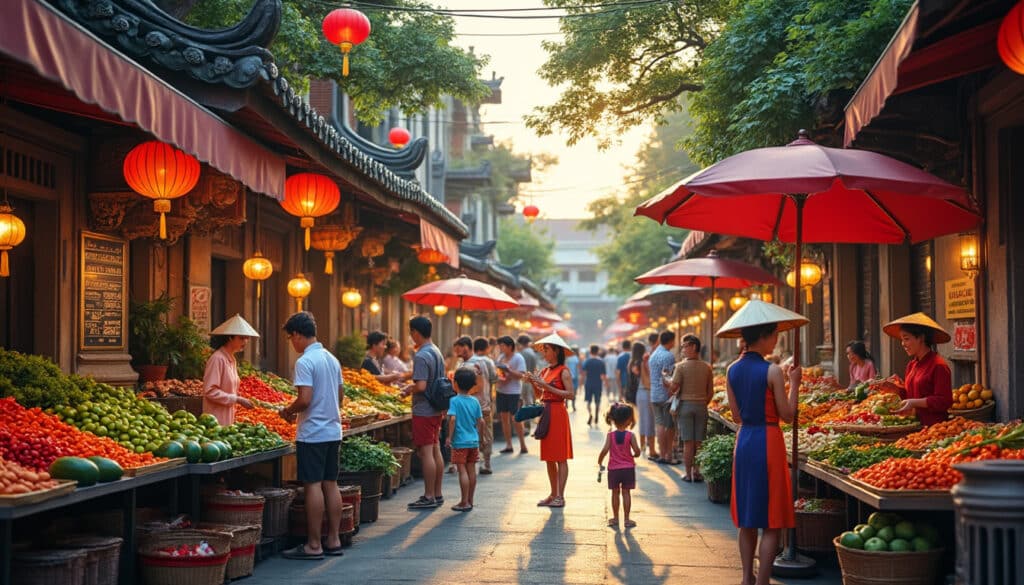
What does Hanoi look, smell, feel like?
Experiencing Hanoi is like stepping into a symphony of vibrant images, lively sounds, and delightful scents. Nestled between historic roots and modern hustle, Vietnam’s capital offers a unique sensory journey. Whether you’re wandering through the alleys brimming with local art…

